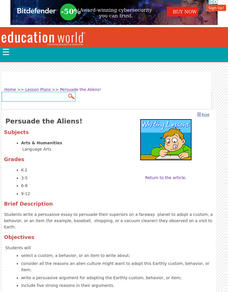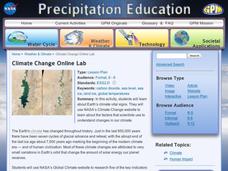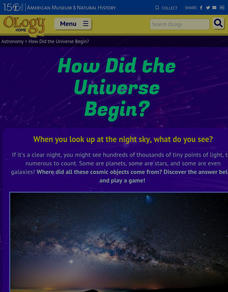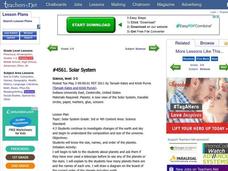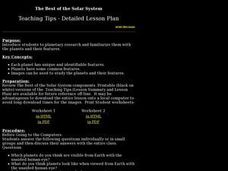Curated OER
Persuade the Aliens!
Why do we do what we do? Imagine that people on a faraway planet came to visit Earth. Could you convince them to adopt a custom or behavior that we participate in here? Learners of all ages write persuasive essays. If you're using this...
Curated OER
Good Vibrations Remote Sensing data Collection: Thermal Emission Spectrometer
The Mars Global Surveyor spent two years creating a mineral map of the planet Mars using thermal emission spectrometry. To help young astronomers understand this remote sensing instrument, have them simulate how data is collected and...
Curated OER
My Angle on Cooling
Students explore how the angle and distance of an object can change it's temperature. After reviewing how the position of the Earth affects the temperature of the planet, student groups design and perform an experiment to test how...
Curated OER
Earth Science Lesson Plans on Geologic Time
Springboard your fourth and fifth graders into the study geologic time. They will complete 7 activities to learn about geologic time and the topics most often associated with it: astronomy, creation, planet formation, volcanology,...
Curated OER
Phoneme Segmenting Accuracy
Take your kindergartners on a journey to the mythical planet Paz where residents segment words into phonemes, touching parts of their arm with each sound. This physical response to phoneme segmenting will appeal to your physical learners...
Curated OER
Earth's Water
If the majority of our planet is covered with water, why do we need to bother conserving it? With a thorough and varied investigation into the location and types of water on the earth, learners will gain an understanding of why this...
NASA
Climate Change Online Lab
What are the key indicators that show scientists that our planet is in the fastest warming trend ever? Learners go on a WebQuest to examine the evidence for themselves. Following several links to NASA sites, kids see how the global...
PBS
Population Simulation with M&M's
Math and M&Ms® go great together when introducing a modeling activity. Allow your learners to simulate population growth and decay of fish in a pond and share their reasoning for the change in fish. With such an impact we have on our...
Howard Hughes Medical Institute
Winogradsky Columns: Microbial Ecology in the Classroom
Winogradsky columns are ideal for observing the role of bacteria and other microorganisms in an ecosystem. This student activity guide is complete with data tables for observations and analysis questions for processing what was observed....
Ocean and Coastal Interdisciplinary Science
The Dark Ocean
Is the ocean blue at all depths? Nope! Explore the science behind the light spectrum in deep, dark waters. The lesson plan recommends watching The Blue Planet: Open Ocean—The Deep, but it's not integral, or you can substitute another...
Mrs. Sol's Class
Solar System Project
Finish or launch your unit on the solar system with a jigsaw project covering major celestial concepts such as the Milky Way Galaxy, asteroids, meteors, comets, Earth's moon, and, of course, all the planets. Learners start by writing...
Messenger Education
Look But Don’t Touch—Exploration with Remote Sensing
Mars is home to the tallest mountain in our solar system, Olympus Mons. For this set of two activities, learners review geologic land formations through the analysis of aerial maps. They then apply this knowledge to aerial maps of...
California Academy of Science
Sustainable Food Solutions: Weighing the Pros and Cons
A growing demand for sustainable food systems comes from schools and even some cities. So what are some solutions? Scholars consider four different ways to approach sustainable food solutions and list the pros and cons of each. The fifth...
California Academy of Science
Rapid Brainstorming: How Can We Improve Our Global Food System?
In 2018, the average fast food burger cost $2.64 while a salad averaged $4.14. Does the price difference matter to public health? Scholars consider that question and others in a brainstorming session about improving our global food...
California Academy of Science
Exploring the Impacts of Feeding the World
Approximately 50 percent of people in the world who are chronically hungry work in agriculture. While it seems counter-intuitive, the farther you live from a farm, the more food options are available. Scholars explore concepts related to...
California Academy of Science
Food for Thought: Defining a Problem to Find a Solution
Scholars approach a problem trying to plan a meal for a class party. They learn about the restrictions and must decide what information they need to plan the meal. The first lesson in a 13-part unit on Our Hungry Planet encourages...
American Museum of Natural History
How Did the Universe Begin?
The Big Bang Theory is more than a television show. Pupils read how Edwin Hubble observed other galaxies and noticed that the galaxies are moving away from each other. Scholars learn about the idea of the big bang and what happened next...
Curated OER
an Explorative Journey Through the Solar System
Students, in groups, research a planet from our solar system. They create Styrofoam models of the planets and place the planets on a correct distance scale from the sun.
Curated OER
Solar System
Students study space. In this solar system lesson, students discover the correct order of the planets and create a diagram showing this knowledge. They listen to the book A New View of the Solar System and then work in groups on their...
Curated OER
Planetary Research (Grades 9-12)
Students are introduced to planetary research and familiarize them with the planets and their features. They see that each planet has unique features. Planets have some common features and that images can be used to study the planets and...
Curated OER
Colonizing the Stars
Middle schoolers compare and contrast the size, composition and surface features of the nine planets of our solar system with the possible sizes and compositions of extra -solar planets.
Curated OER
Fine Motor Skills
Fourth graders discuss what they know about the planets, space, and the solar system including the colors of the planets. They also talk about why the planets are the color that they are. Next, they color cut-outs of the planets using...
Curated OER
Earth
Fourth graders engage in a study of the solar system. The teacher constructs an outside model of it. They walk through it making constructive observations. Students conduct a class discussion about the solar system and planets. They...
Curated OER
Planetary Poster
Students engage in a study about the planets and create a poster as one of the projects during the study. They create individual charts for mapping the solar system so the locations can be found in mock space missions to other planets.
Other popular searches
- Inner and Outer Planets
- Worksheets Planets
- Paper Mache Planets
- Inner Planets
- Nine Planets
- The Planets
- Imaginary Planets
- Sun and Planets
- Stars and Planets
- Planets Outer Space
- Planets and Astronomy
- Outer Planets


